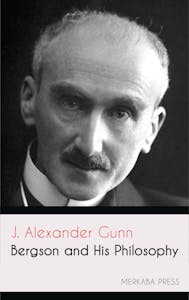The stir caused in the civilized world by the writings of Bergson, particularly during the past decade, is evidenced by the volume of the stream of exposition and comment which has flowed and is still flowing. If the French were to be tempted to set up, after the German manner, a Bergson-Archiv they would be in no embarrassment for material, as the Appendix to this book—limited though it wisely is—will show. Mr. Gunn, undaunted by all this, makes a further, useful contribution in his unassuming but workmanlike and well-documented account of the ideas of the distinguished French thinker. It is designed to serve as an introduction to Bergson's philosophy for those who are making their first approach to it, and as such it can be commended.
The eager interest which has been manifested in the writings of M. Bergson is one more indication, added to the many which history provides, of the inextinguishable vitality of Philosophy. When the man with some important thought which bears upon its problems is forthcoming, the world is ready, indeed is anxious, to listen. Perhaps there is no period in recorded time in which the thinker, with something relevant to say on the fundamental questions, has had so large and so prepared an audience as in our own day. The zest and expectancy with which men welcome and listen to him is almost touching; it has its dangerous as well as its admirable aspects. The fine enthusiasm for the physical and biological sciences, which is so noble an attribute of the modern mind, has far from exhausted itself, but the almost boundless hope which for a time accompanied it has notably abated. The study of the immediate problems centring round the concepts of matter, life, and energy goes on with undiminished, nay, with intensified, zeal, but in a more judicious perspective. It begins to be noticed that, far from leading us to solutions which will bring us to the core of reality and furnish us with a synthesis which can be taken as the key to experience, it is carrying the scientific enquirer into places in which he feels the pressing need of Philosophy rather than the old confidence that he is on the verge of abolishing it as a superfluity. The former hearty and self-assured empiricism of science is giving way before the outcome of its own logic and a new and more promising spirit of reflection on its own "categories" is abroad. Things are turning out to be very far from what they seemed. The physicists have come to a point where, it may be to their astonishment, they often find themselves talking in a way which is suspiciously like that of the subjective idealist. They have made the useful discovery that if you sink your shaft deep enough in your search for reality you come upon Mind. Here they are in a somewhat unfamiliar region, in which they may possibly find that other instruments and other methods than those to which they have been accustomed are required. At any rate, they and the large public which hangs upon their words show a growing inclination to be respectful to the philosopher and an anxiety (sometimes an uncritical anxiety) to hear what he has to say.
